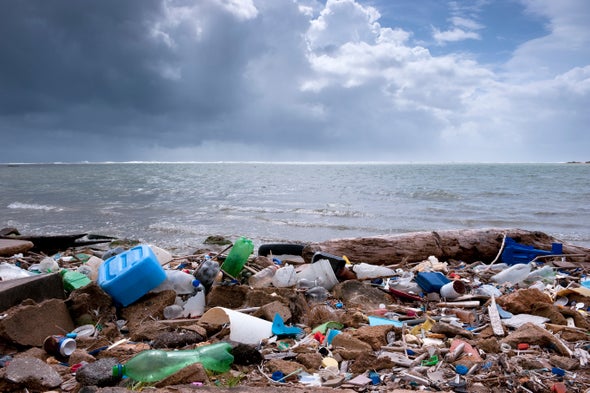(单词翻译:单击)
听力文本
This is Scientific American's 60-second Science, I'm Steve Mirsky.
So you buy something made of plastic and it's labeled biodegradable. You can rest easy knowing that after you throw it out it will harmlessly break down. Well, not so fast.
"When we look at biodegradability as it pertains to landfills, biodegradability is not a desirable attribute for a material. And the reason for this is that when we design for biodegradability, we're typically designing for rapid biodegradability, and yet landfills do not begin to collect the gas that's produced typically for two years...so much of the gas, the methane, from biodegradability is released to the environment before gas collection systems are installed."
Morton Barlaz. He heads the Department of Civil, Construction and Environmental Engineering at North Carolina State University. And he spoke June 6th on Capitol Hill at the third "Science on the Hill" event, co-hosted by Scientific American and California Congressman Jerry McNerney. The theme of this session: "Solving the Plastic Waste Problem."
"Now I just answered the question from a landfill perspective. If I were to switch hats and say, well, is it desirable from a litter perspective, sure. If it actually biodegrades and is converted to gas, then the litter would disappear, and that's desirable. But let's make sure it's really biodegrading and not just degrading into small pieces that nobody can see. That's degradability, it's not biodegradability."

Also on the panel, Kara Lavender Law, Research Professor at the Sea Education Association in Woods Hole. She studies plastic debris in the ocean. What about biodegradability there?
KL: "I do not think that it is possible to design a material that will do that in the open environment and certainly not in the ocean...my understanding is that a lot of the standards around classifying a material as biodegradable are done under temperatures of 30 C, and for reference the average temperature of the surface ocean spans 0 C to 25 C. With an average temperature of 4 C. So even if you had a magical material that satisfied all the other environmental criteria, it's likely that that kind of breakdown would occur on such slow timescales that waste would build up and probably cause environmental harm. So...we shouldn't think of the ocean or the environment as a magical disposal of our waste."
More of the session and a discussion of some solutions will air on an upcoming episode of the long-form Scientific American podcast, Science Talk. And the next 60-Second Science podcast will look at a new study on just how many tiny pieces of plastic you're ingesting every day.
For Scientific American — 60-Second Science. I'm Steve Mirsky.
参考译文
这里是科学美国人——60秒科学系列,我是史蒂夫·米尔斯基。
假如你买了一些塑料制品,上面标明“可生物降解”。那你就可以放心了,因为你知道将它扔掉后它会无害降解。嗯,不要太快下结论。
“当我们从适合垃圾填埋场的特性这一角度考虑生物降解能力时,会发现它并不是理想的材料属性。原因是,我们在设计生物降解能力时,通常会追求快速的生物降解,然而垃圾填埋场尚未开始收集两年内产生的气体,生物降解产生的如此多的甲烷气体,会在安装气体收集系统之前就被释放到环境中。”
莫顿·巴拉兹说到。他是北卡罗莱纳州立大学土木、建筑和环境工程系主任。6月6日,他在国会山举行的第三届“国会山上的科学”活动上发表了讲话,该活动由《科学美国人》和加州国会议员杰里·麦克纳尼共同主办。本届会议的主题是“解决塑料垃圾问题”。
“刚才我只是从垃圾填埋场的角度来回答这个问题。那如果我换个说法,从垃圾角度来看,生物降解可取吗?答案是肯定的。如果垃圾真的能被生物降解并转化为气体,那垃圾就会消失,所以是可取的。但我们要确保,这是真的生物降解,而不是将垃圾分解成没人能看见的小块。这是降解,但不是生物降解。”
同一小组的卡拉·拉文德·洛是伍兹霍尔海洋教育协会的研究员。她主要研究海洋中的塑料碎片。海洋中的生物降解情况如何?
卡拉·拉文德·洛:“我认为不可能设计出一种材料,在开放环境中可生物降解,而在海洋中肯定不能,我的理解是,很多将材料分类为可生物降解的标准都是在30℃条件下确定的,而海面的平均温度从0度到25度不等。平均温度为4度。因此,即便拥有可满足其他环境标准的神奇材料,那种降解也可能会耗费很长时间,导致垃圾堆积,可能还会造成环境危害所以,我们不应该将海洋或环境视为垃圾的完美处置场所。”
更多内容以及一些解决方案收录在即将播出的加长版科学美国人播客《科学对话》中。下一期“60秒科学”播客将关注一项新研究,探讨你每天摄入多少塑料碎片。
谢谢大家收听科学美国人——60秒科学。我是史蒂夫·米尔斯基。
译文为可可英语翻译,未经授权请勿转载!
重点讲解
重点讲解:
1. throw out 扔掉,丢掉(废弃物);
On the day I brought my little girl home from the hospital, I made my husband throw out all the remaining sweets.
就在我带着我女儿从医院回家的那一天。我要求我丈夫扔掉了家里所有剩余的糖果。
2. break down (使)(物质)分解;
The oil is attacked by naturally occurring microbes which break it down.
原油受到了自然产生的分解油类物质的微生物的侵蚀。
3. pertain to 与…相关;属于;适用(于);
The restrictions he imposed pertained to the type and height of buildings and the activities for which they could be used.
他限制的是建筑物的种类和高度以及它们的用途。
4. build up (使)积聚;(使)逐渐增加;
Slowly a thick layer of fat builds up on the pan's surface.
慢慢地,平底锅表面积起了一层厚厚的油脂。


